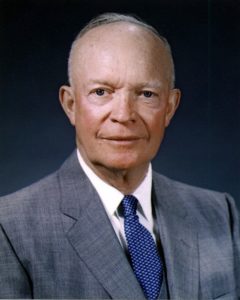Oddly, those people who use the appellation “conspiracy theorist” for people who have concluded, based on the evidence, that the U.S. national-security establishment carried out a very sophisticated and deadly regime-change operation against President Kennedy on November 22, 1963, never apply their appellation to Presidents Eisenhower, Kennedy, and Truman.
What’s up with that?
Consider Ike. In his Farewell Address in 1961, he issued a shocking warning to the American people. He said that the “military-industrial complex” posed a grave threat to their liberties and democratic processes.
Now, just think about that for a moment. That’s a shocking statement. What Ike was saying is that there was grave danger that the Pentagon and the CIA would violently oust a democratically elected American president from office and take over the reins of the government.
In other words, like what happened in Chile in 1973, with the full support of the Pentagon and the CIA. The Chilean military-intelligence establishment attacked the president of the country and attempted to assassinate him with missiles fired at him from military jets. They also had infantry and armor units surround his position in the national palace. Wearing a military helmet and employing a high-powered weapon, the president fought back. The war was short-lived. The president did not survive the war, and the national-security establishment took full control over the government.
Ike was delivering a real warning of what he considered to be a real threat to the president of the United States, who, as everyone knows, is democratically elected. He was telling Americans that given the overwhelming power of the Pentagon and the CIA in America’s governmental structure, an American president faced the very real possibility of being violently removed from office, including through assassination.
Why would the national-security establishment do such a thing? Well, for the same reason that the Chilean national-security establishment did it in Chile against their president — because, in their eyes, a president has been deemed to have become a threat to “national security.” Keep in mind: In the eyes of the national-security establishment of any country, it is their responsibility to protect the nation from all threats, both foreign and domestic. And as the Chilean people discovered on September 11, 1973, and as the American people had discovered ten years earlier on November 22, 1963, it is the national-security branch of the government that has the final say on who and what constitute threats to “national security.
President Kennedy also understood the nature of the national-security establishment’s power and its potential for employing that power against the executive branch. He was once asked by a friend whether as president he felt that he faced that type of danger from the Pentagon and the CIA. Kennedy responded that the national-security establishment would forgive one or two major mistakes, such as the Bay of Pigs disaster, but that with a third such mistake, the Pentagon and the CIA would likely take action to remove the president in order to, in their eyes, save the country.
Interestingly, Kennedy, like Ike, decided to issue his own warning to the American people about this danger. Having read a novel titled Seven Days in May, Kennedy persuaded friends in Hollywood to make it into a movie. The movie, which has the same title and which stars Burt Lancaster, Ava Gardner, and Kirk Douglas, has the U.S. military establishment conspiring to remove a U.S. president whose policies, the military believes, are destroying the country. Kennedy even permitted the filmmakers to use the White House to film parts of the movie.
Then, thirty days after the Kennedy assassination, an op-ed entitled “Limit CIA Role to Intelligence” by former President Truman was published in the Washington Post. The op-ed stated that the CIA had become a sinister force in American life. Remember: It was Truman who brought the CIA into existence in 1947. In his op-ed, he emphasized that the CIA was supposed to have been solely an intelligence-gathering agency, not one involved in covert operations.
Was it a coincidence that Truman had his op-ed published only 30 days after the Kennedy assassination? Not a chance. This was a man who knew the CIA backwards and forwards. He undoubtedly could recognize that the assassination, due to its high level of sophistication, had all the earmarks of a CIA assassination.
Were Ike, Kennedy, and Truman “conspiracy theorists” for pointing out the dangers that the national-security establishment posed to a democratically elected president and to American democracy? On the contrary, they were three individuals who were trying to apprise Americans of the very real danger that this aberrant form of governmental structure poses to democracy.
For more information, see:
NEW! Morley v. CIA by Jefferson Morley
JFK and the Unspeakable: Why He Died and Why It Matters by James K. Douglass
JFK’s War with the National Security State: Why Kennedy Was Assassinated by Douglas Horne
The Kennedy Autopsy by Jacob G. Hornberger
The Kennedy Autopsy 2 by Jacob G. Hornberger
CIA & JFK: The Secret Assassination Files by Jefferson Morley
Regime Change: The Kennedy Assassination by Jacob G. Hornberger
The Evil of the National Security State by Jacob Hornberger
Altered History by Douglas Horne (video series)
The JFK Assassination by Jacob Hornberger (video series)
The National Security State and JFK (conference videos)




